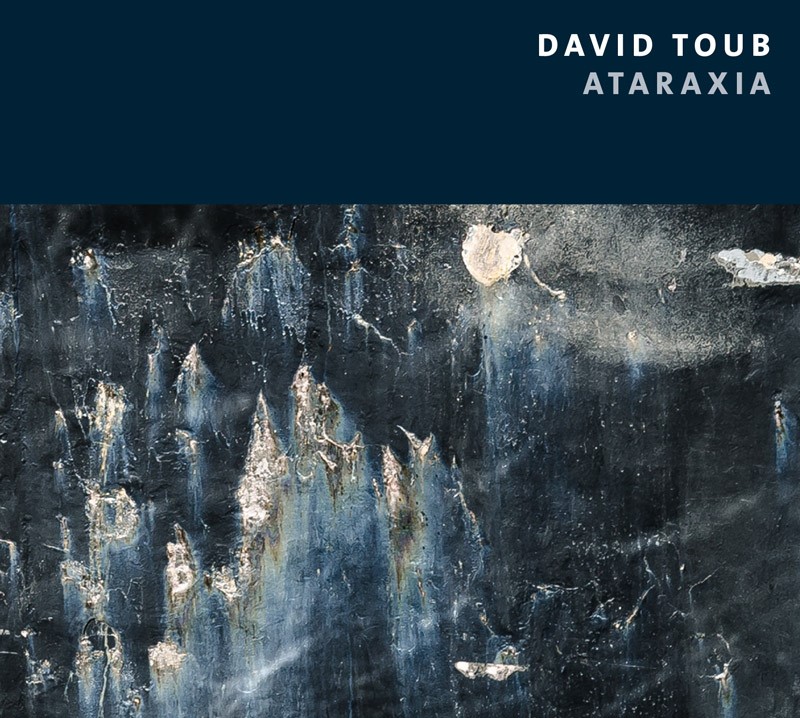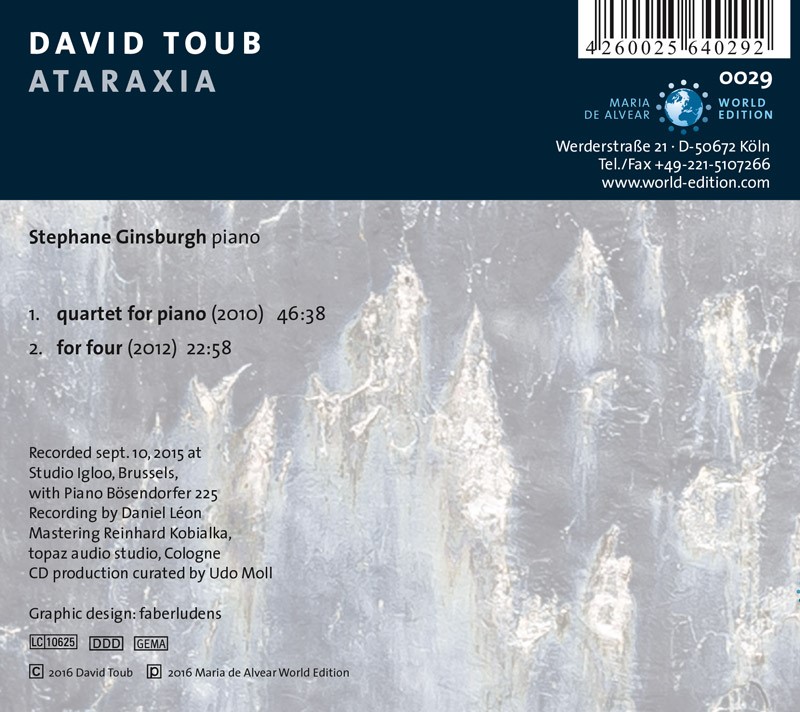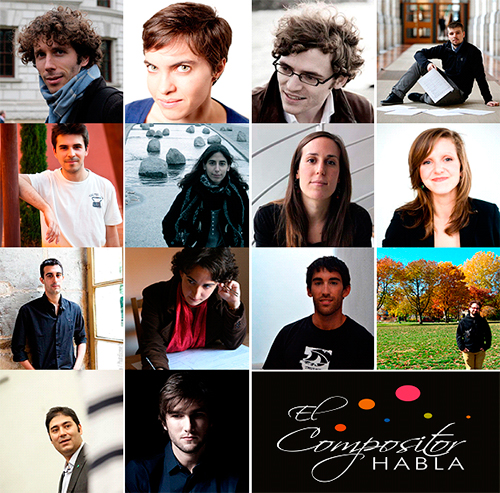Entrevistas
María de Alvear | World Edition Project 3-Interview with David Toub
29/01/2017
Entrevista. La editorial World Edition presenta su último CD: Ataraxia, de David Toub. Desde 1981 la música de Toub se ha caracterizado por el uso de la repetición, y desde 2004 por una dinámica generalmente suave. Aunque a menudo se denomina "minimalista" o "postminimalista", ha llegado a preferir el término "música enfocada". Hemos hablado con el compositor y esto es lo que nos ha contado.
"I will say that the title of the CD, Ataraxia, is both a historical and a medical term meaning a state of extreme tranquillity."
.jpg) 1. Ruth Prieto: World Edition has just published your work ATARAXIA. What can you tell us about the CD?
1. Ruth Prieto: World Edition has just published your work ATARAXIA. What can you tell us about the CD?David Toub: Ataraxia is a CD that contains two solo piano works of mine: quartet for piano (from 2010) and for four (composed in 2012). These are wonderfully performed by the Belgian pianist Stephane Ginsburgh, who gave the world premiere of quartet for piano in Brussel in 2014.
Quartet for piano is not a “piano quartet,” but rather a solo piano work that is written in four voices, which sometimes play at different speeds. For four is an open-instrumentation work, and can be performed either by solo keyboard or for any four instruments. Both works are very quiet, with little or no instruction for the performer. These are in contrast to other works of mine that are more animated and pattern-based.
2. R.P.: What are we going to discover in this work?
David Toub: I think that’s an individual journey. But I will say that the title of the CD, Ataraxia, is both a historical and a medical term meaning a state of extreme tranquillity.
3. R.P.: Could you explain to us the meaning behind this term “focused music,” which you use to describe your music?
David Toub: Sure. My music has been called a lot of things, including some terms that are not quite complimentary. In particular, because it tends to contain a good deal of repetition or minimal musical elements, my music has been called either minimalist or postminimalist. Truth be told, I had no idea what postminimalism was when I first heard my music referred to in that way. And I certainly take no offense when people call it minimalist or postminimalist. But I prefer the term “focused music,” mainly because I think it’s more accurate.
My works, whether very sparse like the works on this album or animated like many of my other compositions, tend to be concerned with a limited number of musical elements for an extended period of time. For example, in a two-piano work called for ruth first (named after the Communist anti-apartheid activist who was assassinated in Mozambique by the South African government), there are only six tones used throughout the entire 20-minute work.
Piece for electronic organ and bongo drums uses just five tones. The opening of quartet for piano focuses on three tones for the first 3-4 minutes, and as an extreme case, the opening minutes of my saxophone quartet zichron consists of a single tone. I used to tell people it’s just one tone, but it’s a pretty good one. Sometimes I focus on a single rhythm with limited tones. So that’s really why I came to like the term “focused music,” and that’s also the title of a continuous work for piano (dedicated to Maria de Alvear) that lasts over four and a quarter hours.
4. R.P.: What is missing today in the dissemination of music of present-day creation? Does it reach a sufficiently wide audience?
David Toub: That’s a very good question and a very complicated topic! I think to some extent the academic folks messed things up for the rest of us by writing music that was purposely esoteric, often perceived (rightly or wrongly) as “cold” and “sterile” and came across as academic exercises for a small coterie of similarly-minded people. I say this as someone who used to compose 12-tone music and who still loves to listen to the New Vienna School, Dallapicolla and many others who employed that technique.
The truth is, however, that new music since then has really amounted to a niche, and it’s probably not going to get much more than that. There are composers who certainly have vast audiences; Reich, Glass and Adams come to mind. But they’re not young anymore, and while it’s nice to see a lot of concerts going on that focus on their music, more needs to be done to get music by the younger generation out there.
"There is a lot of good music out there by composers who are just not well known"
At the same time, we live in a promising time for new music in that the traditional paradigm for composers is no longer needed. One does not need to teach in a conservatory or in academia, have a publisher and rely on a small group of university-associated musicians to get performed. The Internet has made all things possible. I and many others self-publish, disseminate our works freely online, and hopefully attract talented, dedicated performers that way. This album would never have happened were it not for that approach.
5. R.P.: Describe the creative process that led to the works on the CD?
David Toub: I tend to compose via improvisation. I’m not a performer, regrettably. I never really learned how to play the piano properly and while I studied the violin for several years, that isn’t very helpful when one wants to compose. But I can at least get around the keyboard, and by improvising, it becomes a matter of capturing a stream of consciousness, in a way. I like the spontaneity of that approach. Unlike decades ago, I don’t write via systems (eg, serialism), although I do occasionally use canonical writing and even some 12-tone rows just to diversify a bit.
6. R.P.: Where are you right now as a composer?
David Toub: I think I’m in a good place. Nothing has really changed significantly, but I’m so gratified by the positive responses to Stephane’s virtuoso performance and artistry on Ataraxia. I did manage to compose focused music, which ended up being over four hours long, and recently wrote a much shorter work for open instrumentation that should be performed next season by the University of Tennessee Martin Contemporary Music Group.
7. R.P.: How do you see the contemporary music scene today?
David Toub: I think it’s very diverse, which is great, and pretty dynamic. Many different styles are represented and it’s good that no one style predominates.
Más informacion en la web de la Editorial World Edition


Biblioteca
Destacamos ...
Nueva Sección Directorio
dedicada a la promoción de compositores, intérpretes, instituciones y editoriales.

dedicada a la promoción de compositores, intérpretes, instituciones y editoriales.



